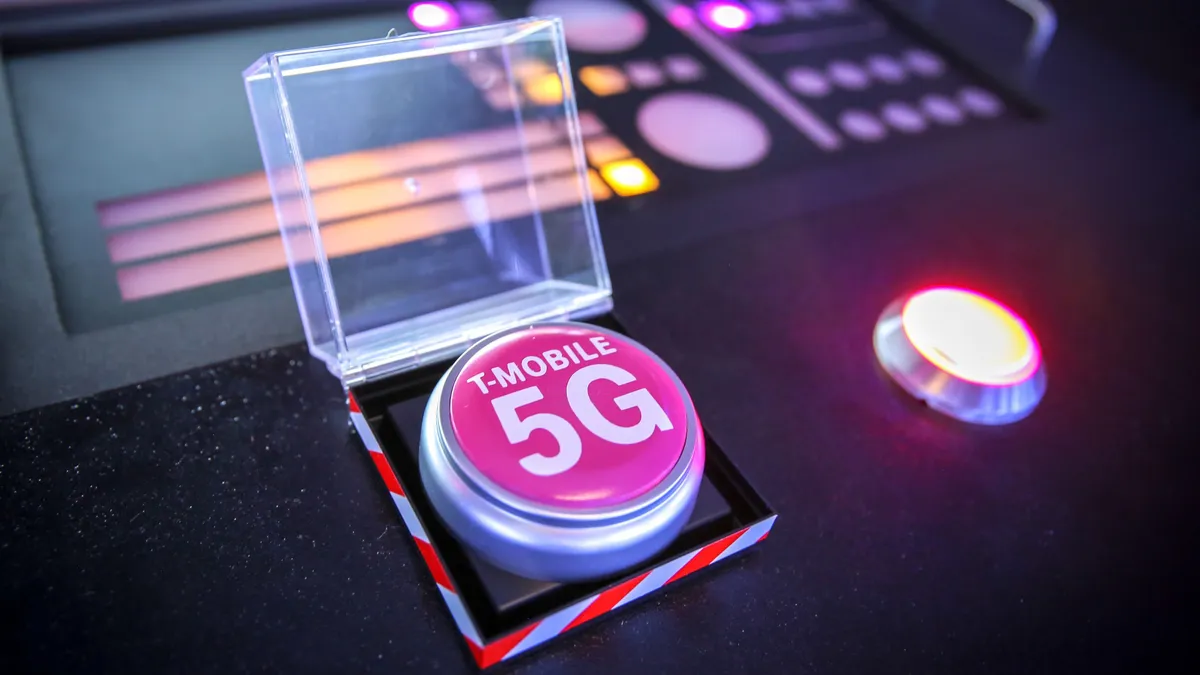Brief:
- T-Mobile yesterday introduced nationwide 5G service that covers 200 million consumers in 5,000 cities and towns. It created a microsite with a zoomable map to show areas where 5G service is currently available.
- The carrier started accepting pre-orders for two 5G-compatible smartphones, the Samsung Galaxy Note10+ 5G and the OnePlus 7T Pro 5G McLaren, which will start shipping on Dec. 6 and be available in stores. T-Mobile is offering a variety of trade-in deals and other promotions on the phones, although its next-generation service will work with other 5G devices. T-Mobile next year will add 15 more 5G smartphone models for sale, per its announcement.
- T-Mobile rolled out a nationwide campaign for TV, radio, digital audio and social media to promote the 5G service. Part of its marketing push focuses on its faster 5G speeds in rural areas that historically had slower service, Ad Age reported. The 5G service will cost the same as its plans for postpaid 4G, which uses the older long-term evolution (LTE) mobile communication standard. The company's Metro by T-Mobile also will be available as the first prepaid 5G service in the U.S. starting Dec. 6.
Insight:
T-Mobile is touting itself as the first provider of nationwide 5G service, but mobile marketers and consumers are right to be wary of claims made by cellular carriers about the next generation of wireless service. Building out the country's network infrastructure and reallocating wireless spectrum for 5G service will take several years, as seen with the gradual expansion of 4G during the past decade. While 5G promises to speed up download times for video and multimedia content like augmented and virtual reality (AR/VR) experiences, it's important to manage expectations for consumer adoption of the new technology.
Observers warn that T-Mobile's coverage doesn't include about 40% of the U.S. population. The country has 330 million people, and T-Mobile's 4G network covers more than 325 million of them, as Ars Technica points out. T-Mobile added 754,000 postpaid subscribers in Q3, bringing its total to 66.5 million, per its latest earnings announcement.
However, T-Mobile's subscriber base will likely grow, and the company will gain more wireless capacity if its merger with Sprint is approved. The Department of Justice and Federal Communications Commission approved the deal, but a coalition of state attorneys general led by California and New York challenged the deal in a lawsuit that's set to go to trial on Dec. 9, The Wall Street Journal reported.
Still, T-Mobile's service isn't as fast as 5G promises to be once cellular carriers build out their networks more completely. 5G is currently about 30% faster than 4G, PC Mag reported, which may not be enough to convert consumers to the new service initially that requires purchasing an updated device. Verizon offers fast 5G service in the central parts of 18 cities, while AT&T provides service in small areas of 21 cities mostly for business customers. AT&T this month will add a slower version of 5G service to five additional cities before expanding again in February. Sprint covers 16 million people in nine cities with medium-fast service, and likely won't see much expansion until the merger with T-Mobile is approved. Regional carrier US Cellular plans to offer 5G service next year.














